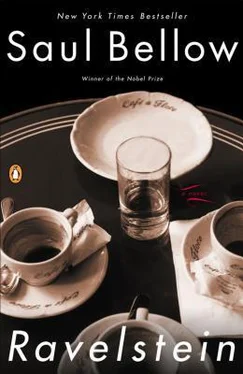"That's perfectly true," I said. He had me there, dead to rights. He might have added when I accused him of preferring nihilists to his "more principled" academic contemporaries that at least the nihilists weren't putting forward any petty-bourgeois deformities and falsehoods as examples of high principle and even beauty.
Nikki, Ravelstein's Chinese son who had nothing at all to do with these conversations, was there to wipe his face. Nikki stepped aside only for the technicians who x-rayed Ravelstein or took blood samples. Now and then I put my hand to my friends bald head. I could see that he wanted to be touched. I was surprised to find that there was an invisible stubble on his scalp. He seemed to have decided that total baldness suited him better than thinning hair, and shaved his head as well as his cheeks. Anyway, this head was rolling toward the grave.
"Is it a dark day outside," Ravelstein asked me, "or am I in a gloomy mood?"
"It's not your mood. There's a thick cloud cover."
It wasn't like Ravelstein either to bother with the weather; the weather would adapt itself to whatever the people that mattered were thinking, and he would sometimes criticize me for "checking out the externals"-keeping one eye on the clouds. "You can count on nature doing what nature has been doing forever. Do you think you're going to rush in on Nature and grab off an insight?" he would say. But these bright moments seldom occurred now. More often he looked comatose-and Rosamund would anxiously whisper, "Is he still here?"
There were times when I couldn't answer with confidence. It had been repeatedly made clear that he couldn't survive, and he lay, irregularly breathing with a stand filled with medicine bottles near his head, ranged behind his large conspicuous ears. At times you thought that he preferred to doze his way into death. He would perhaps be following some line of thought he didn't care to discuss. He had devoted himself mainly to the two poles of human life-religion and government, that was how Voltaire had put it. Ravelstein didn't believe that Voltaire was intellectually serious, but now and then he did summarize things conveniently. And Ravelstein, nowadays, would have added that Voltaire, famous for the campaigns he fought-"_Ecrasez l'infame!"__-violently hated Jews. And there was yet another physical difference to note. Ravelstein's extended body was very large, he was nearly six and a half feet tall and his gown, which reached to the ankles of ordinary patients, ended just above his knees. Then his large underlip had an affectionate flexure but his big nose was severe. He was breathing through his mouth. His skin had the texture of cooked farina.
I could see that he was following a trail of Jewish ideas or Jewish essences. It was unusual for him these days, in any conversation, to mention even Plato or Thucydides. He was full of Scripture now. He talked about religion and the difficult project of being man in the fullest sense, of becoming man and nothing but man. Sometimes he was coherent. Most of the time he lost me.
When I mentioned this to Morris Herbst he said, "Well, of course he'll keep talking things out while there's a breath in his body left-and for him this is top priority, because it's connected with the great evil." I well understood what he meant. The war made it clear that almost everybody agreed that the Jews had no right to live.
That goes straight to your bones.
Other people have some choice of options-their attention is solicited by this issue or that, and being besieged by issues they make their choices according to their inclinations. But for "the chosen" there is no choice. Such a volume of hatred and denial of the right to live has never been heard or felt, and the will that willed their death was confirmed and justified by a vast collective agreement that the world would be improved by their disappearance and their extinction. Rismus, which was Professor Davarr's word for viciousness, hatred, determination to be rid of this intrusive population in furnaces or mass graves. We needn't go into this any further. But what persons like Herbst and Ravelstein concluded was that it is impossible to get rid of one's origins, it is impossible not to remain a Jew. The Jews, Ravelstein and Herbst thought, following the line laid down by their teacher Davarr, were historically witnesses to the absence of redemption.
So as he was dying, thinking of these questions, Ravelstein formulated what he would say but was not able to deliver his conclusions. And one of these conclusions was that a Jew should take a deep interest in the history of the Jews-in their principles of justice, for instance. But not every problem can be solved. And what _could__ Ravelstein have done?
But anyway he wouldn't be here to do it. In that case what was the most significant suggestion he could make to friends? He began to talk about the approaching high holidays and directed me to take Rosamund to the synagogue. Herbst was certain that Ravelstein was indicating the way which was best for the Jews, who had nothing of greater value than this religious legacy.
Herbst and Ravelstein had been close as students forty years ago, and I could do worse than turn to Herbst for guidance. But if I began to ask questions, I would become involved in self-explanation and I had no stomach for this. Ravelstein was dying-he lay wrapped at full length, eyes shut. He was either asleep or thinking what had to be thought in these last days. My feeling was that he was trying to do all that could be done in these final moments-done, I mean, for the people under his care, for his pupils. Now I was too old to be a pupil, and Ravelstein didn't believe in adult education. It was far too late for me to Platonize. And what people called culture was nothing but a fancier term for their ignorance.
Ravelstein sometimes said that I was a sleepwalker by choice, but this didn't mean that I was unteachable, just that it was up to me to decide when I would be ready to make my moves.
You might tell me something of great importance, and I would understand it well enough, but refuse entirely to take it in. This was no ordinary stubbornness.
Now there are few people you can discuss such matters with. Too bad about that. Since we are so often called upon for judgments, we naturally coarsen them by constant use or abuse. Then of course you see nothing original, nothing new; you are, in the end, no longer moved by any face, or any person. Now this was where Ravelstein had come in. He turned your face again toward the original. He forced you to reopen what you had closed.
I went so far one day as to dictate some notes on this subject and my then-secretary Rosamund made an unusual personal comment. She said, "I think I understand what you are talking about." I was persuaded by and by that it was really so.
Nikki, Ravelstein's heir and his chief mourner-the rivals were numerous-occupied his flat, just around the corner. There was a grassy space between his apartment building and ours where little kids tumbled and learned to throw and catch. From my bedroom window I looked across to what had once been Ravelstein's place. You saw the lights. There were no more parties. Worse still, Rosamund rightly said, "The whole neighborhood has become a cemetery. The community of your dead. You can't even take a walk without pointing out the doors and windows of old friends and acquaintances. We can't go around the block without your remembering old pals and girlfriends. Ravelstein was a dear friend-one in a million. But he would say that you were carrying an overload of depression."
She felt that we must move away. We had the house in New Hampshire and a three-year invitation by a university in Boston to give the courses (as well as I could, alone) that Ravelstein and I had given together. Rosamund and I were offered comfortable quarters in the Back Bay area. She would manage the move, I needn't worry about that. Since the Back Bay apartment was fully furnished, we could sublet the Midwest one. It would still be possible to come back if the East didn't suit us. And we needn't dread looking across the grassy lots straight into Ravelstein's windows.
Читать дальше












